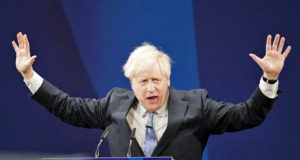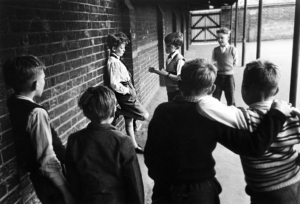It happens every Thursday during term time. To the side of St Michael’s street, arched neo-gothic buildings. A dingy bar, a library which never has enough plugs, and a crenelated debating hall. That’s the Oxford Union. It is, apparently, the nursery of all the ailments that afflict the kingdom.
Every Thursday: eminent guests and student debaters meet in the hall. It has been a House of Commons for speechifying embryos since 1823. Points of order; references to honourable gentleman; rules-based pedantry; pomposity; ambition. “An incomparable school of politics”, Jan Morris called it.
The show is watched by the fish-cold marble faces of grown up to grandeur Union men: Gladstone, Asquith, Curzon, Macmillan, and Salisbury. To speak here is to join an exclusive club. To speak well here may be the first croaking syllables towards ultimate power. One day: you — yes, you boy! — can be a bust.
The Union is where Boris Johnson, Michael Gove, and Jacob Rees-Mogg began their political ascents. But, as you may have gathered, Oxford has launched more than contemporary Tories. The university’s yellow-grey colleges educated Dr Johnson and Sir Walter Raleigh, the only English Pope, Earl Hague and Shelley, ten Viceroys of India, VS Naipaul and Bill Clinton. Oh, and the Financial Times columnist Simon Kuper.
It was summer, 2019. People who read the FT were still unsure why Brexit happened, beyond knowing that whatever made it happen was not good. At that moment Kuper appeared, and wrote an article that was so delicious, and so put-all-the-dots-together, it immediately went viral. What machine spat out Brexit? Oxford. Which wackily irresponsible creche raised Boris Johnson? Oxford. The reason Kuper provided was not good. An old story (unearned privilege; naughty toffs) that has always chilled Britain’s fretful not quite upper-middle classes. It was just what Remainers wanted to read. Finally, an explanation that satisfied all their priors.
Now the viral article is a short and typical non-fiction book. Chums: How A Tiny Caste of Oxford Tories Took Over the UK. Kuper’s story is simple. One afternoon he flicked through some old Cherwells, where he had been a student journalist in the late Eighties, and realised that the names there were the same ones bothering the pages of the Times in the late 2010s. Gove, Cameron, and Johnson; Hunt, Hannan, and Rees-Mogg. He had covered them back then, and here they were again, running Britain into the ground by levering it out of the EU. “Though we didn’t realise it, we were witnessing British power in the making,” Kuper writes of his time at Oxford.
The Brexiteers were not just Brexiteers. They were Oxford Brexiteers. They belonged to a generation that faced no wars, no real poverty, no famines, and not a single earthquake. A generation “without tragedy” — if we ignore Edward St Aubyn, who drifted through Oxford in those years. Instead, la haute had Brideshead Revisited on ITV, champagne, strawberries, and the polished company of sloaney girls in floaty dresses. A dreamy epicurean garden world of velvet and lavender, where young men lofted Nigella Lawson through parties on a sedan chair, far from the Trade Unionists and Left-wing council officers who despised them all.
After Oxford they moved into opinion journalism, then to politics. Bored, nostalgic, and louche, they seized on Brexit as a Thing To Do, and for a game to play. Their dislike of Brussels was personal, not political. The EU might get in the way of their God-given, Oxford-inculcated right to rule. “Brexit was above all their generational grand project,” Kuper argues, “designed to protect the powers of their personal fiefdom of Westminster.”
Other than Dan Hannan, who is approvingly compared to the steely early Bolsheviks, Kuper does not think much of his Oxford Tory Brexiteers. Nevertheless, he is good on Boris. On the sad clown tensions; his “killer” cynicism; his studied Wooster-Waugh role-playing. Then again, no one left in London media should be in this game if they can’t file 1,000 classy words of Boris pop-psych at this point. As Kuper points out himself: “[Boris] possessed the political asset of being all too easy to write about.”
As for Boris, so for Brexit. So easy to write about, if your aim is to titillate rather than explain. Did Brexit happen because Michael Gove, David Cameron and Boris Johnson learned that “the rules didn’t apply to them” in Oxford in the Eighties, as Kuper suggests? Did Brexit happen, as Fintan O’Toole argued in Heroic Failure, because England’s toffs ‘n’ plebs still harbour a sickly yearning to hear the sound of trumpets on the plains of Omdurman? And did Brexit happen, as every half-drunk Etonian I’ve met since June 2016 has insisted to me, because Boris Johnson got into Pop, and David Cameron didn’t? In a century, these tropes may be of sociological interest to historians, but they will not have much explanatory power.
Admit it: we all like a conspiracy theory. History becomes simpler that way. We can ignore material conditions, and argue that change comes about in the small rooms where men manufacture opinions. Chums is this kind of history. Kuper, like fellow Oxford man Cecil Rhodes before him, believes that ideas, not circumstances, ruthlessly organised and disseminated, are what move things.
Oxford can fool anyone there into thinking this way. Walk around cobbled Radcliffe Square at night, when it gets spooky and hushed, and you may believe that this private place is the inner sanctum of Britain. The centre of the centre, the bullseye, and the only place that really matters. The fact that none of this is true — there is no experience quite as shattering as sneaking into a high-altitude, Nobel Prize-winner stuffed seminar at All Soul’s and realising that half the room is as stupid as you are — doesn’t stop Kuper. “To understand power in today’s Britain,” he writes, “requires travelling back in time to the streets of Oxford, somewhere between 1983 and 1993.”
Oxford always loved a romantic tale like Chums, though Kuper would hate to think he’s written one. The university delights in being the mover behind massive historical events. Romantics say Oxford was responsible for the discovery of America, based on the fact that a paragraph from Roger Bacon’s Opus Majus gave Columbus the idea of a westward passage to India. When Roger Boyle devised his law of gas expansion in his grubby High Street lodgings in 1662, wasn’t he launching the Age of Steam? When Edmund Cartwright — Fellow of Magdalen — invented the power-loom in 1785, didn’t he make the Industrial Revolution inevitable? To this list Kuper adds Brexit. Another Oxford fantasy, like Tolkien’s Middle-Earth, and Carroll’s Wonderland. Made at the Union, delivered in Westminster.
Kuper is far from romantic about Oxford though. As with the current Vice-Chancellor Louise Richardson, and many students there today, he seems embarrassed that it exists at all. Embarrassed — only after saying what a powerful and important and special place it is, even if it is powerful and important and special in negative ways.
Chums ends up baffled by Oxford. Kuper cannot see the point of the place in our supposed-to-be meritocratic age. Like Hooper walking through the Marchmain’s palatial house in Brideshead Revisited, Kuper is troubled. “It doesn’t seem to make any sense,” says Hooper, “one family in a place this size. What’s the use of it?”
Kuper doesn’t trust the house to clean itself up. Outside forces must intervene, before young over-valeted men with long faces — he raises the ominous spectre of Jacob Rees-Mogg’s nephew play-acting at the Union recently — get big ideas again. So make a use for it. Make it a postgraduate “Institute of Advanced Studies”, he says. Or go even more full FT: convert Oxford into a start-up hub, and make “even more money from corporate conferences and executive education”. He thinks this will make Britain a fairer place.
This is like cutting a man in half and telling him to dance. Kuper wants to maim Oxford — but why stop there? Once you have abolished the undergraduate system that has endured for eight centuries, you may as well bring it all down. Bulldoze it. Cull the Magdalen deer park. Pull down the Sheldonian, crater the Bodleian. Wouldn’t the Union make a wonderful bingo hall?
Don’t pretend Oxford can be fixed, or that it is more powerful than it actually is. Don’t pretend, as Kuper does, that countries can ever have justly selected ruling elites. Either shutter Oxford (and watch in horror as another elite arises from another elite forcing house) — or otherwise accept it for what it is, and always will be. A microcosm of British society: stratified, argumentative, semi-democratic, drunk. An artefact of cruel, cold beauty that will never be fair.
Disclaimer
Some of the posts we share are controversial and we do not necessarily agree with them in the whole extend. Sometimes we agree with the content or part of it but we do not agree with the narration or language. Nevertheless we find them somehow interesting, valuable and/or informative or we share them, because we strongly believe in freedom of speech, free press and journalism. We strongly encourage you to have a critical approach to all the content, do your own research and analysis to build your own opinion.
We would be glad to have your feedback.
Source: UnHerd Read the original article here: https://unherd.com





